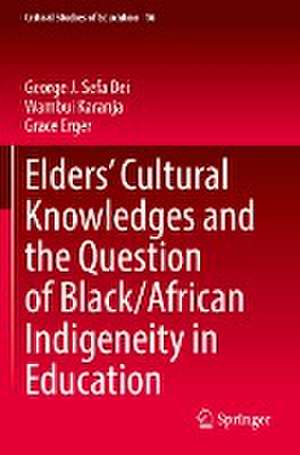Elders’ Cultural Knowledges and the Question of Black/ African Indigeneity in Education: Critical Studies of Education, cartea 16
Autor George J. Sefa Dei, Wambui Karanja, Grace Ergeren Limba Engleză Paperback – 5 ian 2023
| Toate formatele și edițiile | Preț | Express |
|---|---|---|
| Paperback (1) | 778.45 lei 6-8 săpt. | |
| Springer International Publishing – 5 ian 2023 | 778.45 lei 6-8 săpt. | |
| Hardback (1) | 784.48 lei 6-8 săpt. | |
| Springer International Publishing – 4 ian 2022 | 784.48 lei 6-8 săpt. |
Din seria Critical Studies of Education
- 24%
 Preț: 575.45 lei
Preț: 575.45 lei - 15%
 Preț: 642.03 lei
Preț: 642.03 lei -
 Preț: 392.37 lei
Preț: 392.37 lei - 18%
 Preț: 787.91 lei
Preț: 787.91 lei - 18%
 Preț: 998.51 lei
Preț: 998.51 lei - 18%
 Preț: 1002.31 lei
Preț: 1002.31 lei - 18%
 Preț: 892.74 lei
Preț: 892.74 lei - 15%
 Preț: 635.15 lei
Preț: 635.15 lei - 18%
 Preț: 723.24 lei
Preț: 723.24 lei - 15%
 Preț: 639.90 lei
Preț: 639.90 lei - 15%
 Preț: 643.84 lei
Preț: 643.84 lei - 18%
 Preț: 730.47 lei
Preț: 730.47 lei -
 Preț: 389.49 lei
Preț: 389.49 lei -
 Preț: 389.11 lei
Preț: 389.11 lei -
 Preț: 390.63 lei
Preț: 390.63 lei - 18%
 Preț: 727.66 lei
Preț: 727.66 lei
Preț: 778.45 lei
Preț vechi: 949.33 lei
-18% Nou
Puncte Express: 1168
Preț estimativ în valută:
148.96€ • 162.31$ • 125.52£
148.96€ • 162.31$ • 125.52£
Carte tipărită la comandă
Livrare economică 23 aprilie-07 mai
Preluare comenzi: 021 569.72.76
Specificații
ISBN-13: 9783030842031
ISBN-10: 3030842037
Pagini: 226
Ilustrații: XI, 226 p.
Dimensiuni: 155 x 235 mm
Greutate: 0.34 kg
Ediția:1st ed. 2022
Editura: Springer International Publishing
Colecția Springer
Seria Critical Studies of Education
Locul publicării:Cham, Switzerland
ISBN-10: 3030842037
Pagini: 226
Ilustrații: XI, 226 p.
Dimensiuni: 155 x 235 mm
Greutate: 0.34 kg
Ediția:1st ed. 2022
Editura: Springer International Publishing
Colecția Springer
Seria Critical Studies of Education
Locul publicării:Cham, Switzerland
Cuprins
Chapter 1. Articulating the Epistemic Challenge.- Chapter 2. Colonial Education in the Canadian Context.- Chapter 3. Responding to the Epistemic Challenge – A Decolonial Project.- Chapter 4. Land and Indigenous Epistemology.- Chapter 5. The Role of Elders and their Cultural Knowledges in Schools.- Chapter 6. Making the Case for Incorporating Elders’ Indigenous Knowledges in Schools.- Chapter 7. Challenges of Incorporating Elders in Schools.- Chapter 8. Conclusion: Imagining New Indigenous Educational Futurities.
Textul de pe ultima copertă
This book makes a strong case for the inclusion of Indigenous Elders’ cultural knowledge in the delivery of inclusive education for learners who are members of minority communities. It is relevant to curriculum developers, teachers, policy makers and institutions that engage in the education of Black, Indigenous, Latinx and other minority students. This book provides opportunities for exploring the decolonization of educational approaches. It promotes the synthesis of multiple types of knowledge and ways of knowing by making a case for the incorporation of Indigenous knowledges and Indigenous Elders as teachers in learning spaces. The book is of interest to educators, students, and researchers of Indigenous knowledge and decolonizing education. Additionally, it is important for educational policy makers, especially those engaged in looking for strategic solutions to bridging educational disparities and gaps for Indigenous, Black, Latinx and other minority learners.
Caracteristici
Challenges epistemic dominance of Eurocentric paradigms in education Provides a platform for integration/synthesis of different knowledge Promotes the validity of indigenous cultural knowledge
